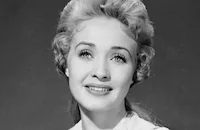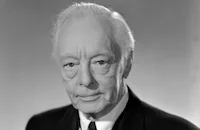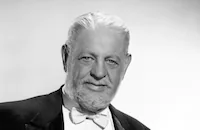Three Daring Daughters

Brief Synopsis
Cast & Crew
Fred M. Wilcox
Jeanette Macdonald
José Iturbi
Jane Powell
Edward Arnold
Harry Davenport
Film Details
Technical Specs

Synopsis
After attending the graduation ceremony of her eldest daughter, New York fashion magazine editor Louise Rayton Morgan is placed under the care of her physician, Dr. Cannon, for an unknown nervous ailment. Louise's three daughters, Tess, Alix and Ilka, suspect that their mother, who divorced their father Charlie, a newspaperman, years earlier, is merely suffering from loneliness and heartbreak. Having been shielded from the fact that their father was a poor provider and deserted their mother, Louise's daughters conclude that what their mother needs is a forced reconciliation with him. Soon after their mother leaves for a vacation in Cuba, Tess, Alix and Ilka pay a secret visit to Charlie's employer, Robert Nelson, who happens to be the thirteenth richest man in America. Determined to get their father recalled from his overseas assignment, the girls tell their story to Nelson. Tess wins Nelson's admiration by singing a special song for him, and he agrees to help the girls get their father back. Meanwhile, on board a cruise ship bound for Cuba, Louise falls in love with famous pianist and orchestra conductor José Iturbi. A romance blossoms, and the couple marry as soon as they reach Cuba. A short time later, Louise returns to New York, and is about to tell her daughters that she has remarried when they announce that they have arranged their father's return. Upset by the news, Louise visits Nelson, explains her situation and asks him to keep Charlie away long enough for her to introduce the girls to José. Nelson understands Louise's predicament and agrees to keep Charlie at bay to give her daughters time to befriend José. Louise is delighted when José easily wins the admiration of her three daughters, but her joy soon turns to sorrow when the girls discover the truth and become resentful. Fearing that she may lose her daughters' trust, Louise separates from José. José, deeply in love with Louise, realizes that the only way he can win Louise back is to have Charlie return to America so that Tess, Ilka and Alix can see for themselves what a poor father he would be. Nelson agrees to help José, but Louise's daughters intervene again and manage to prevent Nelson from sending for Charlie. Unable to abide the girls's numerous entreaties and their meddling in their mother's personal affairs, Nelson berates them for denying Louise the happiness she deserves and demands that they leave his home. Tess, Ilka and Alix eventually realize their selfish behavior, and, after apologizing to their mother and José, they forge a reconciliation bewteen the happy couple.

Director

Fred M. Wilcox
Cast

Jeanette Macdonald

José Iturbi

Jane Powell

Edward Arnold

Harry Davenport
Moyna Macgill
Mary Eleanor Donahue

Ann E. Todd

Tom Helmore
Kathryn Card
Dick Simmons
Amparo Iturbi
Larry Adler
Dorothy Porter

Thurston Hall
Nan Bennett
Charles Coleman

Ian Wolfe
Stephen Hero
Leon Belasco
Virginia Brissac
Frank Pershing
Bill Lewin

Thomas E. Breen
William Forrest
Joanee Wayne
Anita Aros
Estelita Zarco
Connie Montoya
Aldana Rios
Don Avalier
Diane Lee Stewart
Dorita Pallais
Nina Bara
Phyllis Graffeo
Conchita Lamus
Jack Lipson
Wheaton Chambers
Ed Peil Sr.
Joan Valerie
Brick Sullivan
Amparo Ballester
David Cota
Crew
Preston Ames
Jules Barbier
Shirley Barker
Earl Brent
Michel Carré
Jack Dawn
Leo Delibes
Dale Deverman
Howard Dietz
Nathan Haskell Dole
Joe Edmondson
Georges Enesco
Sammy Fain
Adrienne Fazan
Ralph Freed
Cedric Gibbons
Charles Gounod
Edvard Grieg
Victor Herbert
Irene
Henri Jaffa
Ray June
Natalie Kalmus
William Katz
Frederick Kohner
Arthur Krams
Sonya Levien
Albert Mannheimer
Joseph Mccarthy
John Meehan
James V. Monaco
Joe Pasternak
Sergei Petschnikoff
Mervyn Price
Charles Camille Saint-saëns
Douglas Shearer
Frank Shugrue
Georgie Stoll
Georgie Stoll
Richard Strauss
Florence Swann
Peter Ilyich Tchaikovsky
Bob Troup
Edwin B. Willis
Dolph Zimmer

Photo Collections
Videos
Movie Clip



Trailer
Film Details
Technical Specs

Articles
Three Daring Daughters (1948) - Three Daring Daughters
The film Three Daring Daughters was to be something of a comeback vehicle for Jeanette MacDonald, who had not made a picture in five years. Aside from a cameo appearance in the star-studded war effort Follow the Boys (1944), MacDonald's last film had come in 1942, opposite Robert Young in Cairo. That same year, she'd made her final film with Nelson Eddy in I Married an Angel. To many, the end of the popular MacDonald-Eddy pairing signaled the end of Jeanette's Hollywood career (and indeed Eddy's, as neither star would be as successful without the other). MacDonald set out solo to pursue her dreams of opera stardom. But she wasn¿t finished with Hollywood quite yet, agreeing to be lured back to MGM in 1948 for Three Daring Daughters. Castmates on the film remember MacDonald as nothing but gracious, displaying none of the fading diva complex. In fact, Jane Powell, in her biography, The Girl Next Door - And How She Grew, would recall MacDonald being "a very funny lady" and that stepping onto a movie set after five years, made the veteran actress "a bit nervous." But Powell is quick to point out that "[MacDonald] was still the elegant grande dame and everyone treated her with deference."
MacDonald was particularly kind to Elinor Donahue (later of Father Knows Best TV fame) on the set of Three Daring Daughters. Donahue remembered Jeanette as "a very warm person" who "adored animals." Around Christmastime, MacDonald began promising Donahue that she had a wonderful gift for her. It seems she'd purchased a white angora cat for the young actress' Christmas present. But the surprise was foiled when another crewmember beat her to the punch and gave Donahue a cat. A confused Donahue would remark to her mother, "I don't know what I did. I showed Miss MacDonald my kitty, and she got angry." But it was apparently a short-lived misunderstanding. In describing Jeanette MacDonald, Donahue would call her "a beautiful, beautiful lady - as you think of a very rich and beautiful aunt that you don't see very often."
Another interesting Three Daring Daughters story told by Donahue concerns MGM's attempts to bring MacDonald's lofty screen persona down to earth. The powers that be thought it might humanize her to sing You Made Me Love You, a song about the vulnerabilities of love. And while MacDonald didn't want to do it, she went along and sang the song her own way. As Donahue remembers it, "I came out to listen, and I was very puzzled by the singing of [You Made Me Love You]. As only a child would do, I had the temerity to go over to her and say, `You know, you're not singing that right. It's gimme, gimme, gimme what I cry for." And she said, `No dear. That's the way Mr. Jolson sings it - not the way I sing it." And indeed, when watching the film, MacDonald's version of the song comes across not so much with longing but rather with a wistful, yet confident smirk.
Perhaps MacDonald was thinking of her own happy marriage to Gene Raymond. The couple was married in 1937 and by the time Three Daring Daughters rolled around in 1948, MacDonald was still so much in love that she would not remove her wedding ring - even on camera. Her secret, she revealed, was a "ring slipcover" that allowed her to disguise her wedding band when she played a single character or to match the jewelry chosen by the costume designer (either gold or platinum). MacDonald swore that she'd never taken her wedding ring off, not even to read the message engraved inside. "You may be sure," she said, "that I know every precious word by heart, but I have never read it myself. Gene has told it to me. I vowed when Gene put it on my finger that I'd never take it off." And she never had to. In atypical Hollywood fashion, MacDonald and Raymond were married for almost thirty years, until her death in 1965.
A few more things to note in Three Daring Daughters: First, MacDonald's many hairstyles, all wigs, were used to make her look a little closer to the age of the fifty-something Iturbi. There's also an appearance by Moyna MacGill (mother of Angela Lansbury) as Mrs. Smith, a name-dropping dance partner. And while Jeanette MacDonald and Jane Powell performed their own songs, Ann Todd and Elinor Donahue's voices were dubbed by Pat Hyatt and Beverly Jean Garbo respectively. And finally, there is the music. The film is packed with standards from Route 66 to Sweethearts and piano/orchestra classics from the likes of Litsz and Mozart. And a tip of the hat to Jeanette MacDonald, who made just one more feature after Three Daring Daughters. Her last big screen performance came in The Sun Comes Up (1949).
Producer: Joe Pasternak
Director: Fred M. Wilcox
Screenplay: Albert Mannheimer, Frederick Kohner, Sonya Levien, John Meehan
Cinematography: Ray June
Film Editing: Adrienne Fazan
Art Direction: E. Preston Ames, Cedric Gibbons
Costume Design: Irene
Cast: Jeanette MacDonald (Louise Rayton Morgan), Jose Iturbi (himself), Jane Powell (Tess Morgan), Edward Arnold (Robert Nelson), Harry Davenport (Dr. Cannon), Elinor Donahue (Alix Morgan), Ann E. Todd (Ilka Morgan).
C-115m.
by Stephanie Thames

Three Daring Daughters (1948) - Three Daring Daughters
Quotes
Trivia
Pat Hyatt dubbed Ann E. Todd's singing, Jean Garbo dubbed Mary Eleanor Donahue's.
This musical was declared "morally objectionable" by the Catholic League of Decency for portraying divorce as respectable.
Notes
Working titles for this film were The Birds and the Bees and Keep Young with Music. According to information contained in the AMPAS Library, the play The Birds and the Bees, which was also known as Pigtails, was unpublished and unproduced at the time M-G-M purchased the film rights. The play was eventually produced in New York under the title The Bees and the Flowers. The film marked Jeanette MacDonald's return to the screen after a four-year absence, and the screen debut of stage actor Tom Helmore. According to pre-production news items in Hollywood Reporter, Geraldine Fitzgerald was considered for the part of "Louise," Sharon McManus was set either for the part of "Alix" or "Ilka" and Elizabeth Taylor was set for an unspecified role.















